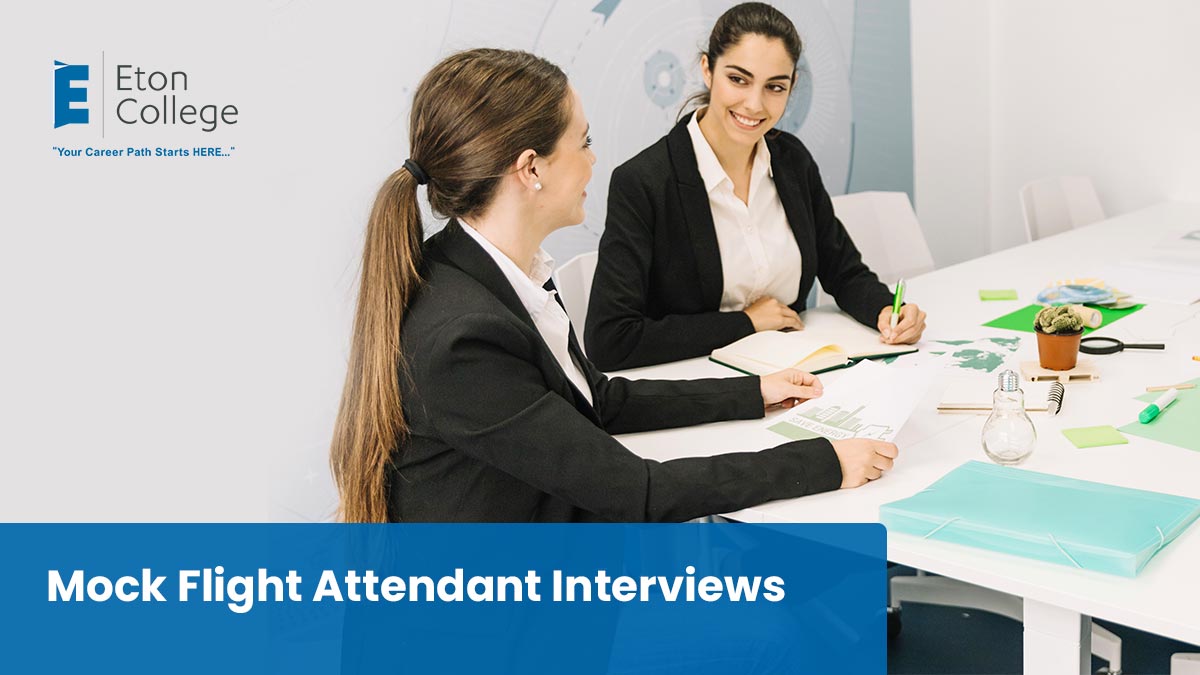- Mock flight attendant interviews help you practice answers and build confidence before the real interview, reducing nervousness.
- Set up a professional environment for your mock interview, dressing in business attire and practicing with a friend or mentor to mimic a real flight attendant interview.
- Prepare for standard flight attendant interview questions, such as “Why do you want to be a flight attendant?” and “How would you handle a difficult passenger?” using the STAR method.
- Maintain good posture, consistent eye contact, and controlled hand gestures during your mock interview to project confidence and professionalism.
- Recording your mock flight attendant interview allows you to review your performance and identify areas for improvement in body language and communication.
Landing a job as a flight attendant is a dream for many, but the flight attendant interview process can be highly competitive. One of the best ways to prepare is by practicing through mock interviews. These mock interviews simulate the real flight attendant interview, allowing you to practice answering questions, improving your communication skills, and presenting yourself professionally. With the right preparation, you can enter the interview feeling confident and ready to succeed.
In this blog, we’ll guide you through how to set up a mock flight attendant interview, the areas to focus on, and tips for ensuring you’re fully prepared for the real thing.
Why Practice with Mock Flight Attendant Interviews?
Mock flight attendant interviews give you a chance to simulate the interview process and practice the skills you need to excel. Here’s why mock interviews are so beneficial:
- Build Confidence: Rehearsing your answers for common flight attendant interview questions helps you feel more confident and less nervous.
- Identify Areas for Improvement: Mock interviews highlight areas where you may need to improve, whether it’s refining your answers, improving your posture, or speaking more clearly.
- Receive Constructive Feedback: If you have someone acting as your interviewer, they can provide valuable feedback that helps you fine-tune your approach.
Related:Post-Interview Etiquette for Flight Attendant Candidates
Setting Up a Mock Flight Attendant Interview
Creating a realistic environment for your mock flight attendant interview will help you get the most out of your practice. Here’s how to set it up:
- Choose an Interviewer: Ask a friend, family member, or mentor to act as the interviewer. Ideally, find someone with experience in the aviation industry or recruitment.
- Simulate a Professional Setting: Conduct the mock interview in a quiet, formal setting. Dress in professional business attire, just as you would for the real flight attendant interview. Practice greeting the interviewer with a firm handshake, maintaining good posture, and making eye contact.
- Prepare a List of Questions: Your mock interviewer should ask both standard interview questions and specific flight attendant interview questions. These could include customer service scenarios, conflict resolution questions, and situational questions related to in-flight safety.
- Record the Interview: If possible, record the session so you can review your answers and body language. Watching yourself on video can reveal areas for improvement that you might not notice otherwise.
Focus on Common Flight Attendant Interview Questions
During your mock flight attendant interview, you should focus on answering the types of questions you’re likely to encounter in a real interview. Here are some examples:
- Why do you want to be a flight attendant?
In a flight attendant interview, you’ll almost always be asked this question. Make sure to emphasize your passion for customer service, your enthusiasm for working in the aviation industry, and your commitment to passenger safety. Tailor your answer to the specific airline by mentioning their values or mission. - How would you handle a difficult passenger?
Airlines want flight attendants who can handle challenging situations calmly and professionally. During your mock interview, practice answering this question using the STAR method (Situation, Task, Action, Result) to explain how you would resolve a conflict and ensure the comfort of all passengers. - Tell me about a time you worked under pressure.
Flight attendants often work in high-pressure environments, so interviewers want to know how you handle stress. Provide a specific example of a time when you had to manage stress or complete tasks under tight deadlines, and explain how you stayed focused and achieved a positive outcome.
Related:How to Answer Behavioral Interview Questions for Flight Attendant
Mastering Body Language and Communication Skills
During a flight attendant interview, your body language is just as important as the answers you provide. Flight attendants need to project confidence, professionalism, and approachability, and these qualities are communicated non-verbally through your posture, gestures, and facial expressions.
- Posture: Maintain good posture throughout the flight attendant interview. Sit up straight with your shoulders back, and avoid slouching or crossing your arms, as this can make you seem closed off.
- Eye Contact: Consistent eye contact shows that you’re engaged and confident. Be sure to maintain eye contact with the interviewer, but don’t overdo it to the point of making them uncomfortable.
- Gestures: Use your hands naturally to emphasize key points, but avoid fidgeting or making large, distracting gestures. Keep your hand movements controlled and purposeful.
- Tone of Voice: Speak clearly and confidently, and vary your tone to avoid sounding monotone. Flight attendants need to communicate well with passengers, so your tone of voice should reflect friendliness and authority.
Related:Pack for Success: Key Essentials for Your Flight Attendant Interview
Practice Answering Behavioral Questions Using the STAR Method
Behavioral questions are common in a flight attendant interview because they allow recruiters to assess how you’ve handled certain situations in the past. The STAR method is an excellent framework for answering these questions:
- Situation: Describe the context of a situation you faced.
- Task: Explain your role in addressing the issue.
- Action: Detail the actions you took to resolve the situation.
- Result: Share the outcome of your actions and what you learned from the experience.
For example, if asked, “How would you handle an in-flight emergency?” you could describe a time when you managed a high-pressure situation, detail the steps you took to ensure passenger safety, and explain the positive outcome of your actions.
Seeking Feedback and Making Adjustments
Once you’ve completed your mock flight attendant interview, seek feedback from your interviewer. Ask them for specific areas where you can improve, such as:
- Enhancing your communication skills
- Offering more detailed answers
- Improving your body language and posture
- Managing nervous habits like fidgeting or speaking too quickly
By incorporating this feedback into your preparation, you’ll feel more confident and polished during the actual flight attendant interview.
Preparing for Your Flight Attendant Career
Participating in mock flight attendant interviews is one of the most effective ways to prepare for a successful interview. By practicing your answers, perfecting your body language, and receiving feedback, you’ll be well-equipped to handle any challenge during the real interview process.
Related:Dress Code and Appearance Tips for a Flight Attendant Interview
For aspiring flight attendants looking to take their preparation to the next level, Eton College offers a comprehensive Flight Attendant Preparation Program. This program provides in-depth training in customer service, safety procedures, and communication skills, helping you excel in your flight attendant interview and launch your career in the aviation industry.





